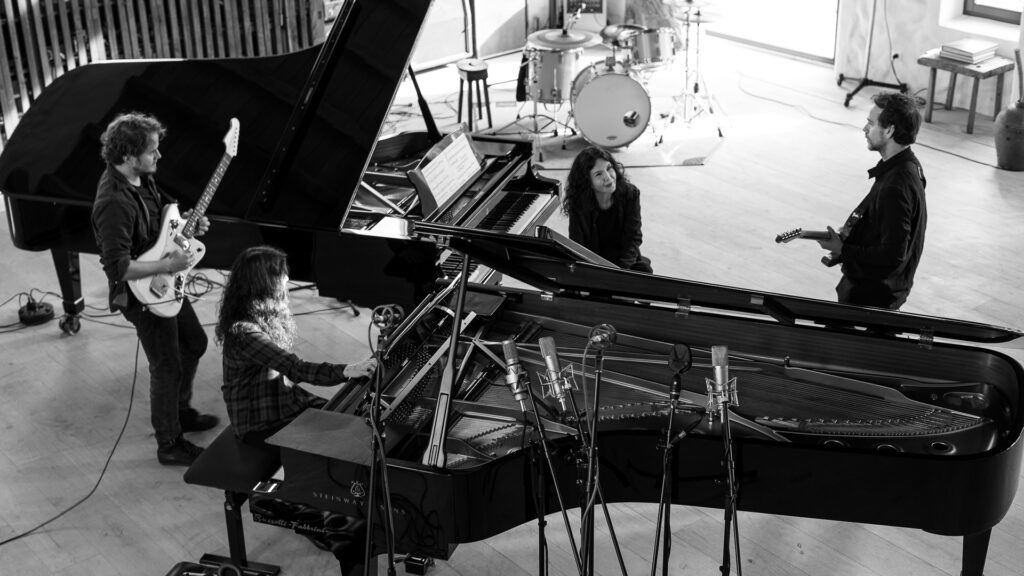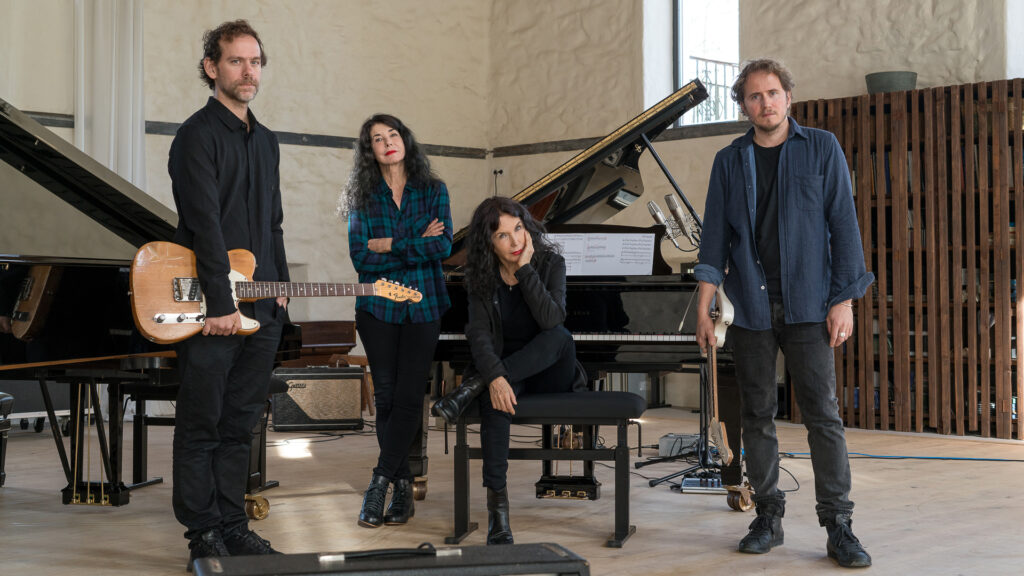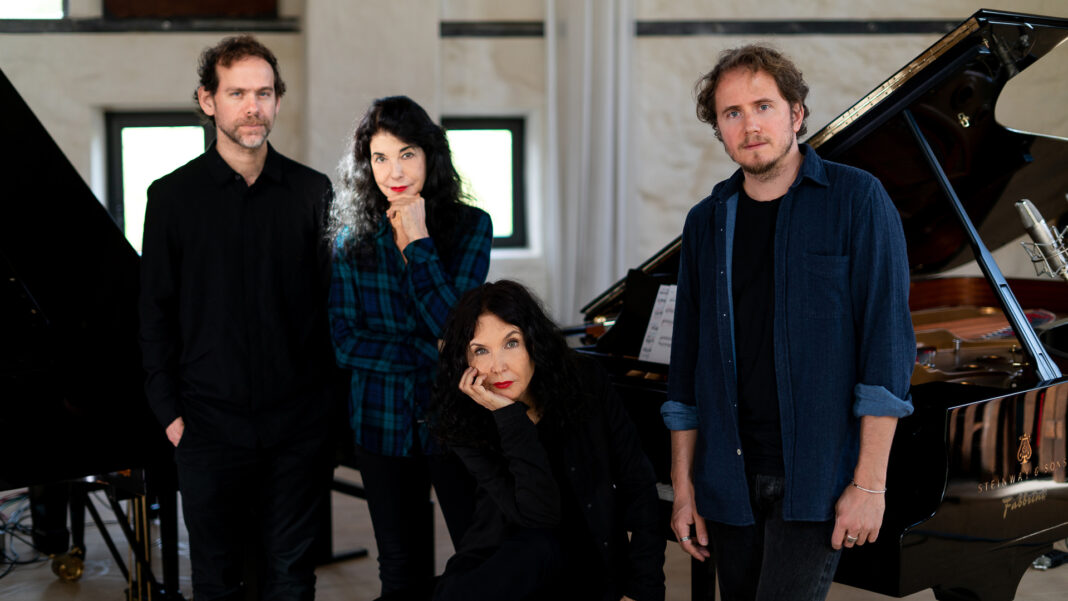Katia and Marielle Labèque are sisters who have traveled the world performing classical music on pianos. Bryce Dessner is a founding member of the band The National and a composer of film scores including The Revenant. David Chalmin is a singer, musician, composer and producer whose collaborations range from Arcade Fire’s Richard Reed Parry to Bruce Springsteen. Put the four of them together and you have Dream House Quartet.
The four artists first collaborated together on the 2019 album El Chan. Six years earlier the Labèque Sisters and Chalmin recorded 2013’s Minimalist Dream House – an album of music by John Cage, Philip Glass, Michael Nyman, Arvo Pärt, Terry Riley and more. The newly named Dream House Quartet released their first album under that name earlier this month. It features works written by Chalmin, Dessner and Meredith Monk. They are now on tour with a performance on Sunday at Royce Hall with CAP UCLA; Wednesday, May 3rd at Toronto’s Meridian Arts Center and concluding on May 5th at Yale’s Schwarzman Center.
Late last week I spoke with Chalmin about the Dream House Quartet, his musical partners (one of whom, Katia, has been his life partner for 20 years) and Thom Yorke of Radiohead whose Don’t Fear the Light, Part 1 & 2 is being performed on their tour. What follows are excerpts from my conversation with Chalmin that have been edited for length and clarity. To see the full interview, please go to our YouTube channel.
Dream House Quartet is performing music by Meredith Monk on this tour. She is quoted as having said, “The more I go through life, I realize that there’s really no separation between practice and art at all. The two things, more and more, become one rather than two different aspects of my life.” Do you feel the same way and how much do you feel like your art and your practice are on parallel paths?
I totally agree. Passion is the main thing with music. In my case it comes with playing the guitar, some piano first, then the guitar, then discovering about electronics and all the mess you see around me. [Best experienced in our video.] You never feel like you’re making art. You actually always think you’re practicing and trying to make something better. To me it’s a craft also. I love thinking of myself as a craftsman. To me it’s a very noble thing. We have this word in French artisan and I like to think of this because after years of practice of many different things you create your own musical personality. My experience is also working with sound and manipulating sound, recording and mixing, so it’s all of these practices that actually make my art, if you want to call it that.
Do you feel like you live your life the way you create your art? Are those two similar for you?
It’s totally the same thing. Actually it’s continuous. It’s not a job. It’s not work. It’s making music, being with people I love. I admire trying to improve on my knowledge and in my instrument experience. It’s only one thing. Totally.
Your first collaboration with the Labèque Sisters was on 2013’s Minimalist Dream House, which obviously shares a bit of the ensemble’s name. That album shares two thirds of the ensemble that became Dream House Quartet. Are there any similarities or differences, or was it merely the introduction of Bryce Dessner as a fourth member?
It was definitely the beginning of that adventure. It was a huge thing for Katia, Marielle and I starting this project. We had other projects before that, but that one in 2013, that’s really when we discovered all the minimalist music. Of course we knew some of it… We were introduced to all these amazing composers and actually that was the moment where everything connected because Katia and I were coming from different backgrounds. [She’s] a classical musician and she’s played a lot of contemporary music and I come from rock/electronic music. Our goal was always to find something to do together. So for years we were looking. In the minimalist movement from the second half of the 20th century, we really found something that made sense for both of us. Because this is the moment when classical musicians decided to do something different and reconnect with folk music, with music from all around the world, and get out of the little elite genre that the contemporary music was finding itself. So that was the beginning of research and assimilation of this music.
Years after, after meeting Bryce Dessner, we became the Dream House Quartet. When we did the first Minimalist Dream House project, we played a lot of existing music and some re-interpretations. But now with the Dream House Quartet, we think more like a band. We play Bryce’s music, my music, and still, of course, some Steve Reich, Philip Glass, and Meredith Monk – the big composers of that musical genre. But now it’s become a band.

In a 2019 conversation I had with Katia and Marielle, we discussed their performing music by Radiohead’s Thom Yorke. She said, “What is really interesting with Thom is he thinks about atmosphere and mystery and it’s really good for us to work with a musician like that.” What are your thoughts about the role of atmosphere in relation to, or in the absence of, melody in a modern work?
To me it’s essential because in the music I’m make, in the music I love, it’s a lot about that. I listen to a lot of ambient music or drone music where you can really get lost in one chord for 15 minutes. It’s actually very hard to reproduce, I think, in written music. But it’s a very interesting challenge. That’s why I believe our meeting, our encounter, is interesting because I can try to make that happen, to create atmosphere with my electronics using their sound.
In the piece Thom Yorke wrote for the quartet [Katia and Marielle] use some electronics and that brings their craft to another level. Those mixes are really interesting. Of course Thom Yorke can play piano and he can program a synthesizer, but he will never be able to do what Katia and Marielle do to bring their hands to his brain and his music. That makes something really unique.
What impresses you most about what Thom Yorke is able to accomplish with his compositional skills?
He has something really special and amazing in the way he uses harmony, I think, because he uses the canvas of normal songs. I mean, they’re never normal and they’re never standard form, but still it feels like a song. But there is always a twist somewhere. There is no Radiohead song that is like a normal folk song. The way that he manages to make that sound normal, natural and beautiful to me, it’s the ultimate goal. It’s the same for any kind of modern music. Like making something weird, new with a twist, but making it feel not simple at the same time is the ultimate and beautiful. Aways there’s like the strange chromatic chord sometimes or the way he uses the melody to make things seem simple when actually it’s all weird in the back.
When you’re curating this tour with Dream House Quartet, what is the conversation that you would like to have with your work, Bryce Dessner’s and Thom Yorke’s works to have with older works by Philip Glass and Meredith Monk and Steve Reich?
I think we’d like the audience to feel that it’s the same musical realm. That there is a sense of all these musicians being on the same program and that it’s not weird; that there is not the classical one and the popular one. That’s the way to tell people it should be less classified and we’re more diverse than when people are seeing music as just one thing.
When I listen to your EP Innocence I get the feeling that there is somehow an examination of how technology encroaches on our daily lives. You have these beautiful melodies and then there’s the technology, there’s the distortion, etc. I don’t know if that was your point, but I find it interesting that you’re using the same technology to express that sentiment. What was that your goal with these five songs?
It was not really conscious, but I’m glad you felt that. To me they’re my tools. I feel as touched by the small keyboard and the upright piano or my electric guitar. They’re just tools and I try to use them in a soothing way for me. The kind of music I make I like is indeed something that I try to cut out from the craziness and puts you more in a calming state. I like to take the time and use repetition to force you into relaxing. Taking a step back to just relax. It’s true we’re always like acting crazy to what’s around us.
What concerns do you have now with all the conversations that are going on about what AI can create and what AI can do and whether that’s going to encroach on originality and creativity?
As far as music is concerned, I’m really not worried at all. I find it’s a very interesting tool and a very scary one at the same time for many different uses. But it’s what people are going to do with it that will make it a problem or not. I guess we’ll have to find out. But as far as music is concerned, I don’t think it’s a problem because the kind of music I listen to or I like or the people I love who make music, they bring something that no machine will ever be able to to recreate. And if the machine starts making the hits of tomorrow, it won’t bother me. It can totally happen. It’s already something like that with 16 guys who know how to do certain things. So to me it’s a bit soulless already. What I like in music is the opposite. It’s where something magical happens and where there is soul and a life behind that’s never going to be predictable.

Philip Glass said, “The past is reinvented and becomes the future, but the lineage is everything.” What do you feel your lineage is as a composer to the past and what would you like others who will compose 30, 40 or 50 years from now to see in your work?
That’s really interesting because I think as composers we have to be humble and know that we are reassembling knowledge and using our heart to put it together and make something unique. Some people may like it or not. In my case it’s really a sum of a lot of different influences.
In terms of lineage, I’m very linked to Baroque music. My parents organized concerts. My father plays the organ and the harpsichord and he also builds harpsichord and organs. So I grew up listening to a lot of Baroque music. Even though as a teenager I got bored by it, I quickly came back to it. It’s a huge influence in my musical life.
Then there is rock; sixties/seventies rock mainly from the Beatles to Led Zeppelin. Then the era I grew up in the nineties with grunge, Nirvana and then Radiohead and then electronic music. It’s so many different things. People can grab sometimes the little things. Or listen to a piece I wrote for a Baroque ensemble which sounds like maybe minimalist music, but it’s played by Baroque instruments. Or in my songs sometimes find that there is very Baroque harmony. Or they use a sound that is similar to something Thom Yorke did. It’s all in there. But I like this idea that we’re just rebuilding and reassembling the parts that the authors have left us.
To see the full interview with David Chalmin, please go here.
All photos: Dream House Quartet (Photo by Graham Macindoe/Courtesy CAP UCLA)










